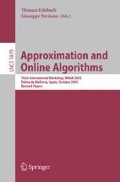Abstract
A traveling salesman game is a cooperative game \(\mathcal{G} = (N, c_{D})\). Here N, the set of players is the set of cities (or the vertices of the complete graph) and c D is the characteristic function where D is the underlying cost matrix. For all S ⊆ N, define c D (S) to be the cost of a minimum cost Hamiltonian tour through the vertices of S∪ {0} where 0 ∉ N is called as the home city. Define Core \((\mathcal{G})= \{x \in \Re^{N} :x(N) = c_{D}(N)\ {\rm and}\ \forall S\subseteq N, x(S) \leq c_{D} (S)n\} \) as the core of a traveling salesman game (\(\mathcal{G}\)). Okamoto [15] conjectured that for the traveling salesman game \(\mathcal{G} = (N, c_{D})\) with D satisfying triangle inequality, the problem of testing whether Core (\(\mathcal{G}\)) is empty or not is NP–hard. We prove that this conjecture is true. This result directly implies the NP–hardness for the general case when D is asymmetric. We also study approximate fair cost allocations for these games. For this, we introduce the cycle cover games and show that the core of a cycle cover game is non–empty by finding a fair cost allocation vector in polynomial time. For a traveling salesman game, let \(\epsilon-{\rm Core} (\mathcal{G})=\{x \in \Re^{N} :x(N) = c_{D}(N) {\rm and}\ \forall S\subseteq N, x(S) \leq {\epsilon}\cdot c_{D}(S)\}\) be an ε–approximate core, for a given ε > 1. By viewing an approximate fair cost allocation vector for this game as a sum of exact fair cost allocation vectors of several related cycle cover games, we provide a polynomial time algorithm demonstrating the non–emptiness of the log2(|N|–1)– approximate core by exhibiting a vector in this approximate core for the asymmetric traveling salesman game. We also show that there exists an ε 0 > 1 such that it is NP–hard to decide whether ε 0–Core(\(\mathcal{G})\) is empty or not.
Access this chapter
Tax calculation will be finalised at checkout
Purchases are for personal use only
Preview
Unable to display preview. Download preview PDF.
References
Berman, P., Karpinski, M., Scott, A.D.: Approximation hardness and satisfiability of bounded occurrence instances of SAT. Technical Report TR03-022, ECCC (2003)
Bird, C.G.: On cost allocation for a spanning tree: a game theoretic approach. Networks 6, 335–350 (1976)
Deng, X., Ibaraki, T., Nagamochi, H.: Algorithmic aspects of the core of combinatorial optimization games. Math. Oper. Res. 24, 751–766 (1999)
Edmonds, J., Johnson, L.: Matching: A well-solved class of integer linear programs. In: Proceedings of Calgary International conference on combinatorial structures and their applications, Gordon and Breach, pp. 89–92 (1970)
Engebretsen, L.: An explicit lower bound for TSP with distances one and two. Algorithmica 35(4), 301–319 (2003)
Faigle, U., Fekete, S.P., Hochstättler, W., Kern, W.: On approximately fair cost allocation in Euclidean TSP games. OR Spektrum 20, 29–37 (1998)
Faigle, U., Kern, W.: On the core of ordered submodular cost games. Math. Program. 87, 483–499 (2000)
Frieze, A., Galbiati, G., Maffioli, F.: On the worst–case performance of some algorithms for the asymmetric travelling salesman problem. Networks 12, 23–39 (1982)
Goemans, M.X., Skutella, M.: Cooperative facility location games. In: Proc. 11th SODA, pp. 76–85 (2000)
Granot, D., Hamers, H., Tijs, S.: On some balanced, totally balanced and submodular delivery games. Math. Program. 86, 355–366 (1999)
Granot, D., Huberman, G.: Minimum cost spanning tree games. Math. Program. 21, 1–18 (1981)
Kaplan, H., Lewenstein, M., Shafrir, N., Sviridenko, M.: A 2/3 approximation for maximum asymmetric TSP by decomposing directed regular multi graphs. In: Proc. of the 44th Annual IEEE Symposium on Foundations of Computer Science (2003)
Kolen, A.: Solving covering problems and the uncapacitated plant location algorithms. Eur. J. Oper. Res. 12, 266–278 (1983)
Kuhn, H.W.: The Hungarian method for the assignment problem. Nav. Res. Logist. Q. 2, 83–97 (1955)
Okamoto, Y.: Traveling salesman games with the Monge property. Disc. Appl. Math. 138, 349–369 (2004)
Papadimitriou, C., Yannakakis, M.: The traveling salesman problem with distances one and two. Math. Oper. Res. 18, 1–11 (1993)
Potters, J.A.M., Curiel, I.J., Tijs, S.H.: Traveling salesman games. Math. Program. 53, 199–211 (1992)
Shapley, L., Shubik, M.: The assignment game I: the core. Int. J. Game Theory 1, 111–130 (1972)
Tamir, A.: On the core of a traveling salesman cost allocation game. Oper. Res. Lett. 8, 31–34 (1988)
Tovey, C.A.: A simplified NP-complete satisfiability problem. Disc. Appl. Math. 8, 85–89 (1984)
Author information
Authors and Affiliations
Editor information
Editors and Affiliations
Rights and permissions
Copyright information
© 2006 Springer-Verlag Berlin Heidelberg
About this paper
Cite this paper
Bläser, M., Ram, L.S. (2006). Approximate Fair Cost Allocation in Metric Traveling Salesman Games. In: Erlebach, T., Persinao, G. (eds) Approximation and Online Algorithms. WAOA 2005. Lecture Notes in Computer Science, vol 3879. Springer, Berlin, Heidelberg. https://doi.org/10.1007/11671411_7
Download citation
DOI: https://doi.org/10.1007/11671411_7
Publisher Name: Springer, Berlin, Heidelberg
Print ISBN: 978-3-540-32207-8
Online ISBN: 978-3-540-32208-5
eBook Packages: Computer ScienceComputer Science (R0)

